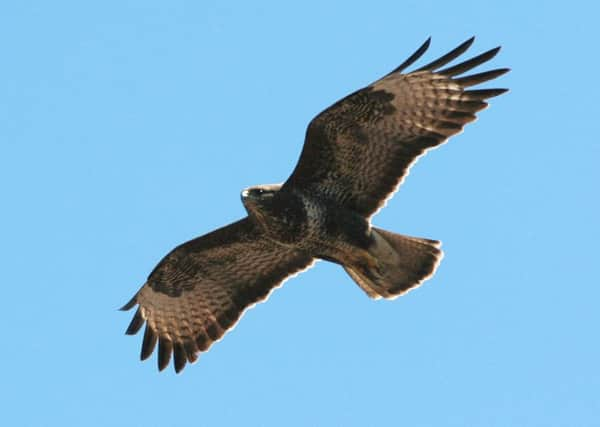North Yorkshire still sees more crimes against birds of prey than any other county


The RSPB is calling for the laws that protect birds of prey to be better applied due to the high levels of illegal persecution nationwide.
In a report published today, North Yorkshire was again highlighted for having the highest number of crimes against birds of prey in 2014, with a total of 36 recorded.
Advertisement
Hide AdAdvertisement
Hide AdConfirmed incidents in the county, which last year saw only 24 “bird of prey incidents”, include three shot buzzards, a shot little owl and an illegally trapped buzzard.
A ‘bird of prey incident’ is one where a crime is suspected or known to have been carried out against a wild bird of prey, normally a shooting, trapping, poisoning or nest destruction incident.
In West Yorkshire, there were five recorded incidents, including a shot red kite and a buzzard caught in an illegal spring trap, as well as seven reported to the RSPB in the East Riding and six in South Yorkshire.
Across the UK, there were 179 reports of shooting and destruction of birds of prey, 27 nest robbery reports and 72 reports of poisoning.
Advertisement
Hide AdAdvertisement
Hide AdConfirmed victims of poisoning include 23 red kites, nine buzzards and four peregrine falcons. These figures are believed to represent only a fraction of the illegal persecution in the UK, with many incidents thought to be going undetected and unreported.
Martin Harper, RSPB Conservation Director, said: “The problem of illegal persecution has tarnished the UK for decades and continues to do so. Strong action is needed now to deliver the effective protection that our birds of prey so urgently need.”
The charity is calling for European nature conservation laws to be fully incorporated into UK law and implemented properly on the ground to offer birds more protection.
Its report said: “The UK’s record on both fronts is nothing to shout about, with the results giving UK species inadequate protection from wildlife crime.”
Advertisement
Hide AdAdvertisement
Hide AdAccording to the RSPB, EU Nature Directives have driven the recovery of many species, such as the white-tailed eagle and red kite.
Mr Harper said: “To protect our magnificent birds of prey we must defend for the laws that protect them, including EU Nature Directives. When applied properly, these laws can help protect our most valuable wildlife and sites.
“All evidence points to the need for a consistent approach and effort across all four UK countries in protecting our most threatened birds of prey, such as the hen harrier and golden eagle, from illegal persecution.
“In this context, there is a strong case for fully implementing the EU Nature Directives consistently across the UK to protect wildlife from illegal killing.”
Advertisement
Hide AdAdvertisement
Hide AdResponding to the report, Sergeant Andy Palmer, of North Yorkshire Police, said: “North Yorkshire Police takes all forms of wildlife crime extremely seriously, including the persecution of birds of prey, and we have a strong track record in bringing perpetrators to justice.
“This type of crime is cruel, illegal and belongs in the past, and we work closely with our partner agencies such as the National Parks to raise awareness, prevent and investigate offences and prosecute those responsible.
“Earlier this year we launched a major poster campaign raising awareness of the dangers of illegal wildlife poisoning. We also took part in Wildlife Crime Awareness Week in October, urging people to understand and recognise the signs of bird of prey persecution.
“It is encouraging that members of the public are increasingly aware of such persecution, and are confident in coming forward and reporting it to the police.
Advertisement
Hide AdAdvertisement
Hide Ad“If you find a bird that you believe has been poisoned, please do not touch it, as poisons can transfer through contact with skin, and keep children and pets well away. Similarly, if you have concerns about a trap, do not take it upon yourself to interfere with it. Instead, take a photograph, get a GPS location if possible, and contact North Yorkshire Police on 101 so we can investigate and take action if necessary.”
Earlier this month, a landmark legal ruling overturned a refused licence bid for permission to shoot buzzards preying on infant game birds, in a move with “significant implications” for the gamekeeping industry.
Yorkshire firm Gordons, acting on behalf of Northumberland gamekeeper Ricky McMorn, led a protracted case that concluded Natural England made the wrong decision not to allow him to shoot buzzards which were killing young pheasants.
For more information about wildlife crime, and the ways in which North Yorkshire Police tackles it, visit www.northyorkshire.police.uk/wildlifecrime.